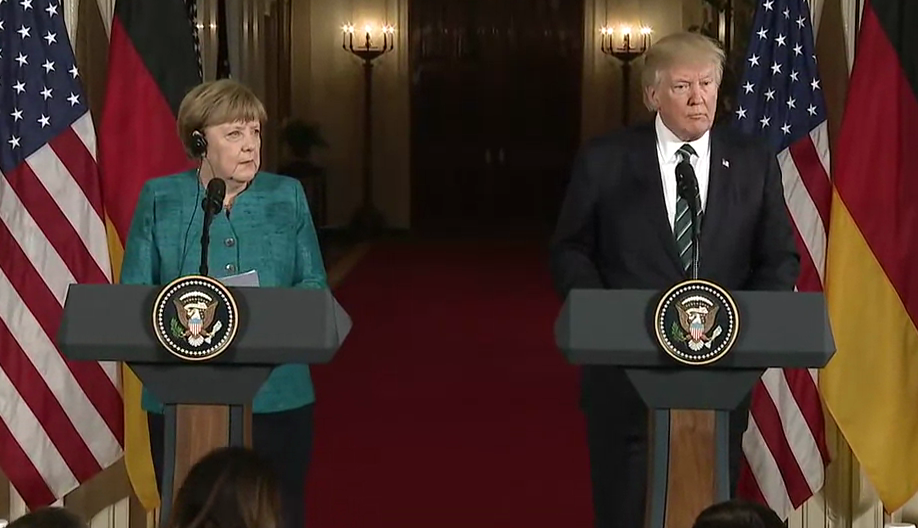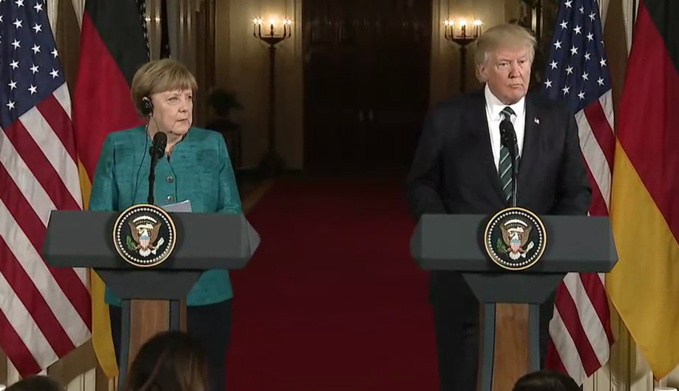The German Ministry of Economics and Energy has been alarmed for several months. The mood reached its apogee reached on Tuesday, June 27, when the US Secretary of Commerce, Wilbur Ross, suddenly refused to visit Germany. He was to arrive in Berlin for talks with German Minister of Economy and Energy Brigitte Zypries, and then meet with Chancellor Angela Merkel.
As explained in Washington, the meeting had to be postponed because of Ross's sudden invitation to an audience with Trump. The German ministry did not comment on the unexpected refusal, but the German media caustically tried to imagine what would it look like if any German minister cancelled his flight to the US under the pretext of an invitation to talk to Merkel.
The visit was supposed to be an attempt to avoid confrontation in the trade relations between Germany and the European Union, on the one hand, and the United States on the other. This should have been the last-ditch effort before the G-20 summit in Hamburg in early July. During his election campaign, Donald Trump promised to correct the "imbalance in world trade", for which, in the White House, he proclaimed a course towards the abolition of free trade and introduction of protectionism.
Trump’s administration accuses China and a number of European states, primarily Germany, of using dishonest methods to misbalance the global trade. The figures of Washington's trade deficit are indeed impressive. In 2016, the United States sold goods and services for $ 481 billion less than purchased. Germany, on the contrary, sold 272 billion euro more. In the first quarter of 2017, Germany – United States trade imbalance was the largest, and one of the most favorable for Germany.
The scale of figures in German-American economic relations is explained by importance of America as a trading partner of Berlin. German firms have created 672 thousand jobs in the US, and are the third most important foreign employers. 70% of exports from Germany consists of products to plants in the United States in a single production process. And more than half of exports from Germany are semi-finished products and equipment, for example, goods of German engineering, which ultimately strengthen the American industry’s position. These are the data of the Ministry of Economics and Energy of Germany.
However, the United States concentrates on other facts. In March of this year, Washington accused China and Germany of dumping when delivering steel to the United States. According to the Trump administration, foreign suppliers sell their products below cost. First of all, it was a question of the Chinese enterprises, but then two German firms, Salzgitter and Dillinger Hütte, were accused in dumping, too.
In April, Donald Trump ordered an investigation about a possible threat to US national security. As he stressed, "steel is important for both our economy and our military: this is not an area where we can be dependent on other countries."
In addition to steel, Washington is checking supply of aluminum and shipbuilding products to the United States. Sales of German cars in the US are also causing discontent - much more modest in comparison with sales of American cars in Germany.
Trump administration considers introduction of protective customs duties on foreign goods as a possible response to the trade imbalance. For the most part, we are talking about steel. This, however, will violate the current principle of free trade in the world and will certainly provoke countermeasures. So, on the day of the cancellation of the visit to Germany by the US Secretary of Commerce Wilbur Ross to Washington, the European Commissioner for Trade Cecilia Malmström spoke very resolutely.
She warned against the appearance of protective duties, called them "unfair" and made it clear that if they were introduced into the United States, Europe would respond in kind. Malmström also condemned trade protectionism as a whole, stressing that countries such as Russia, Brazil, China and India have already been seen violating the free trade principles, and the US transition to protectionism will only exacerbate this trend.
However, Washington is still not certain in this matter. So, Minister Ross, who canceled the visit to Germany, on Tuesday also unexpectedly gave a videoconference speech at the conference of the German party CDU - in the presence of the Federal Chancellor.
There, he stressed the US readiness to resume negotiations with the European Union on an agreement on the Transatlantic Trade and Investment Partnership (TTIP). The negotiations have been lasting for 3 years and were frozen with the arrival of Trump to the White House. Theoretically, the agreement can remove many of the current trade disagreements, reminded Angela Merkel.
However, the US minister also repeated some of the previous threats of Washington, so it's too early to talk about detente in relations. Moreover, on Tuesday, Ross made it clear what Trump’s administration wants: "We want to obtain (from Europeans - Ed.) those market shares of the liquefied natural gas market that other countries have now." This is a direct hint to Russia, which supplies gas to European consumers.
source: dw.de
As explained in Washington, the meeting had to be postponed because of Ross's sudden invitation to an audience with Trump. The German ministry did not comment on the unexpected refusal, but the German media caustically tried to imagine what would it look like if any German minister cancelled his flight to the US under the pretext of an invitation to talk to Merkel.
The visit was supposed to be an attempt to avoid confrontation in the trade relations between Germany and the European Union, on the one hand, and the United States on the other. This should have been the last-ditch effort before the G-20 summit in Hamburg in early July. During his election campaign, Donald Trump promised to correct the "imbalance in world trade", for which, in the White House, he proclaimed a course towards the abolition of free trade and introduction of protectionism.
Trump’s administration accuses China and a number of European states, primarily Germany, of using dishonest methods to misbalance the global trade. The figures of Washington's trade deficit are indeed impressive. In 2016, the United States sold goods and services for $ 481 billion less than purchased. Germany, on the contrary, sold 272 billion euro more. In the first quarter of 2017, Germany – United States trade imbalance was the largest, and one of the most favorable for Germany.
The scale of figures in German-American economic relations is explained by importance of America as a trading partner of Berlin. German firms have created 672 thousand jobs in the US, and are the third most important foreign employers. 70% of exports from Germany consists of products to plants in the United States in a single production process. And more than half of exports from Germany are semi-finished products and equipment, for example, goods of German engineering, which ultimately strengthen the American industry’s position. These are the data of the Ministry of Economics and Energy of Germany.
However, the United States concentrates on other facts. In March of this year, Washington accused China and Germany of dumping when delivering steel to the United States. According to the Trump administration, foreign suppliers sell their products below cost. First of all, it was a question of the Chinese enterprises, but then two German firms, Salzgitter and Dillinger Hütte, were accused in dumping, too.
In April, Donald Trump ordered an investigation about a possible threat to US national security. As he stressed, "steel is important for both our economy and our military: this is not an area where we can be dependent on other countries."
In addition to steel, Washington is checking supply of aluminum and shipbuilding products to the United States. Sales of German cars in the US are also causing discontent - much more modest in comparison with sales of American cars in Germany.
Trump administration considers introduction of protective customs duties on foreign goods as a possible response to the trade imbalance. For the most part, we are talking about steel. This, however, will violate the current principle of free trade in the world and will certainly provoke countermeasures. So, on the day of the cancellation of the visit to Germany by the US Secretary of Commerce Wilbur Ross to Washington, the European Commissioner for Trade Cecilia Malmström spoke very resolutely.
She warned against the appearance of protective duties, called them "unfair" and made it clear that if they were introduced into the United States, Europe would respond in kind. Malmström also condemned trade protectionism as a whole, stressing that countries such as Russia, Brazil, China and India have already been seen violating the free trade principles, and the US transition to protectionism will only exacerbate this trend.
However, Washington is still not certain in this matter. So, Minister Ross, who canceled the visit to Germany, on Tuesday also unexpectedly gave a videoconference speech at the conference of the German party CDU - in the presence of the Federal Chancellor.
There, he stressed the US readiness to resume negotiations with the European Union on an agreement on the Transatlantic Trade and Investment Partnership (TTIP). The negotiations have been lasting for 3 years and were frozen with the arrival of Trump to the White House. Theoretically, the agreement can remove many of the current trade disagreements, reminded Angela Merkel.
However, the US minister also repeated some of the previous threats of Washington, so it's too early to talk about detente in relations. Moreover, on Tuesday, Ross made it clear what Trump’s administration wants: "We want to obtain (from Europeans - Ed.) those market shares of the liquefied natural gas market that other countries have now." This is a direct hint to Russia, which supplies gas to European consumers.
source: dw.de



















